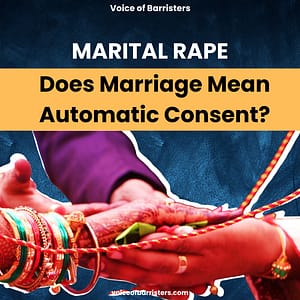Marital Rape in Indian Jurisprudence
7 min read
Introduction
Marital rape, also known as spousal rape, is the act of having sexual relations with one’s spouse without the other’s consent. The crucial aspect is a lack of permission, which does not have to involve physical assault. Marital rape is a type of domestic violence and sexual assault.
It is a sort of sexual assault or rape in which one spouse forces or coerces the other into sexual acts against their choice.
Although sexual intercourse inside marriage was previously viewed as a right of couples, participating in the act without the agreement of the spouse is now frequently classed as rape by many civilizations around the world, and is becoming progressively criminalized. Some more conservative societies, however, reject it.
What is marital rape?
The act of sexual intercourse or sexual activity within a legally recognized marriage without the consent of one’s spouse is referred to as marital rape.
It is a sort of sexual assault or rape in which one spouse forces or coerces the other into sexual acts against their choice.
Women, albeit not primarily, are victims of marital rape. Marital rape is frequently a chronic type of violence for the victim that occurs inside violent relationships.
It occurs in a complicated web of state governments, cultural traditions, and societal ideas that interact in various ways to influence each distinct incident and situation.
The reluctance to define and prosecute non-consensual sex between married couples has been attributed to traditional views of marriage, interpretations of religious doctrines, ideas about male and female sexuality, and cultural expectations of a wife’s subordination to her husband — views that remain prevalent in many parts of the world.
Historically, there were exemptions or legal loopholes in many countries and legal systems that prevented marital rape from being prosecuted as a criminal act.
This was founded on the assumption that marriage meant perpetual permission to sexual behavior between spouses.
However, many legal systems throughout the world have evolved in recent decades to acknowledge that permission should still be sought within a marriage, just as it is outside of marriage.
Legality of Marital Rape in different countries
The legality of marital rape varies from country to country, and it has evolved over time in many places. Historically, rape laws did not apply within marriages, but social attitudes have shifted.
Due to a paucity of recent court cases, the applicability of rape laws to spouses remains uncertain in some nations.
Certain countries, such as those that inherited the 1860 Indian Penal Code (for example, Singapore, India), expressly protect spouses from prosecution, declaring that sexual intercourse between a man and his own wife is not considered rape.
There are several countries that explicitly excludes husbands as a perpetrator of their wife’s for example is Ethiopia “Article 620 – Rape: Whoever compels a woman to submit to sexual intercourse outside wedlock, whether by use of violence or grave intimidation, or after having rendered her unconscious or incapable of resistance, is punishable with rigorous imprisonment from five years to fifteen years.”
But there are several which criminalizes the Marital Rape. Poland was the first country to criminalize it in 1932, and Australia followed suit in 1976, during the second wave of feminism.
In the 1980s, common law countries such as South Africa, Ireland, Israel, Ghana, and others joined. Scandinavian countries and the Communist bloc followed suit in the following decades.
Marital immunity was removed by New York’s Court of Appeal in 1984, and all states in the United States have criminalized marital rape. Nepal did the same in 2002, with its Supreme Court emphasizing constitutional violations such as equal protection and privacy.
Legalization of Marital Rape in India
Marital Rape is a very debated topic in India due to its frequency and claims filed in the courts throughout the countries geographical boundary. Marital Rape has been never explicitly cited in Indian Penal Code there is only a single that too very far relation which can be seen through exception 2 of section 375 IPC.
The exception has been challenged by RIT Foundation, All India Democratic Women Association and two individuals. Opposing the striking down of this exception are the Delhi government, NGO Hridaya Foundation and Amit Lakhani and Ritwik Bisaria of Men Welfare Trust.
Exception 2 of section 375 of the Indian Penal Code states that “Sexual intercourse or sexual acts by a man with his own wife not being under fifteen years of age, is not rape” *
https://indiankanoon.org/doc/623254/
This exception explicitly makes rape on one’s wife, above the age of fifteen permissible.
The primary justification for criminalizing marital rape is that it is a serious felony that violates a woman’s rights and equality under the Indian Constitution (Articles 14 and 21).
This marital impunity also runs counter to international norms (General norms 19 and 35), which regard sexual and mental injury as discriminatory and a violation of fundamental rights.
The Indian government’s attitude on marital rape also violates international treaties such as the International Covenant on Civil and Political Rights and the Universal Declaration of Human Rights, which demand equal protection for all people, regardless of marital status.
Marital rape, in essence, establishes unjust differences between married and unmarried women. Violence against women is a violation of their fundamental and human rights, according to the 59th session of the Commission on Human Rights in 2003.
Cases in India which highlight the issue
Independent Thought vs Union of India (2017) – The Supreme Court held that sexual intercourse with a girl below 18 years of age, even if she is a wife, is rape.
A watershed court case in India that addressed child marriage and sexual abuse of minors within marriage. It was started by the non-governmental organization Independent Thought to challenge a provision in the Indian Penal Code that excused husbands from rape charges if their wives were over the age of 15.
The Indian Supreme Court ruled that any sexual encounter with a girl under the age of 18, even if she is married, is rape and is punishable under the Indian Penal Code.
This decision was a breakthrough moment in India’s fight against child marriage and sexual abuse of children within marriages. It filled a legal void and empowered minor victims by recognizing their rights.
Union of India vs. RIT Foundation (2019) – The Delhi High Court ordered the government to reconsider altering legislation to make marital rape a crime.
The Delhi High Court addressed marital rape and the legal protection of women in abusive marriages. The RIT Foundation challenged the constitutionality of Section 375 of the Indian Penal Code (IPC), which exempts husbands from rape accusations if their wives are over the age of 15.
The Delhi High Court instructed the government to explore modifying legislation to punish marital rape, citing the exemption in Section 375 as violating the right to life and personal liberty and discriminating against married women.
While this case was a crucial step toward recognizing marital rape as a crime in India, and it highlighted the need for legal change, marital rape remains unpunished in the country as of the most recent update.
Kavita vs. Haryana State (2020) – The case addressed the subject of marital rape and the need for legal protection for women in abusive marriages. In this case, the High Court of Punjab and Haryana decided that the exemption in the Indian Penal Code (IPC) that exempts a husband from rape charges was discriminatory and needed to be examined.
Union of India vs. Megha (2021) – A woman filed the action after her spouse subjected her to sexual violence and abuse. The case emphasized the need for comprehensive legislation to combat marital rape and the lack of protection for women in abusive marriages.
What is the need of this law?
Several major issues lead to the need for a marital rape law:
Consent and Autonomy: A crucial principle in any sexual interaction is consent. Marital rape laws are required to demonstrate that marriage does not automatically indicate permission to sexual conduct.
Every person, regardless of marital status, has the right to choose when and how they participate in sexual actions within a relationship.
Gender Equality: Marital rape laws promote gender equality by recognizing that both spouses have equal rights and that no one should be subjected to sexual assault or abuse within a marriage. This helps to deconstruct conventional power inequalities and patriarchal standards.
International Human Rights Treaties and Agreements: Many international human rights treaties and agreements, such as the Universal Declaration of Human Rights and the Convention on the Elimination of All Forms of Discrimination Against Women (CEDAW), stress the importance of protecting individuals from violence and ensuring their rights within marriages.
Accountability and Deterrence: A marital rape statute serves as a deterrence to potential offenders while also holding perpetrators accountable for their conduct. It sends a clear message to society and the court system that sexual abuse within marriage will not be condoned.
Public knowledge and Education: Passing such legislation can raise public knowledge about the issue of marital rape, urging people to recognize it as a form of abuse and seek help when necessary. It can also help with prevention efforts through education and outreach.
It is crucial to note that many countries recognize the need for a marital rape legislation, but the specifics of these laws, such as the age of consent and other criteria, may differ.
The ultimate goal is to defend all individuals’ rights and well-being, regardless of marriage status, and to abolish all types of violence and abuse within intimate relationships.
Conclusion
According to recent statistics, 5.4% of married women in India have experienced marital rape, with 4.4% having experienced it within the last year. This stark reality runs counter to the country’s commitment to safeguarding citizens’ dignity in all circumstances.
Marital rape is an obvious violation of human rights, and it has been recognized and criminalized in many nations throughout the world.
India, on the other hand, has yet to do so, with its legal system exempting husbands from rape charges if their wives are over the age of 15.
This exclusion has been strongly criticized as discriminatory and infringing on the constitutional rights of women.




